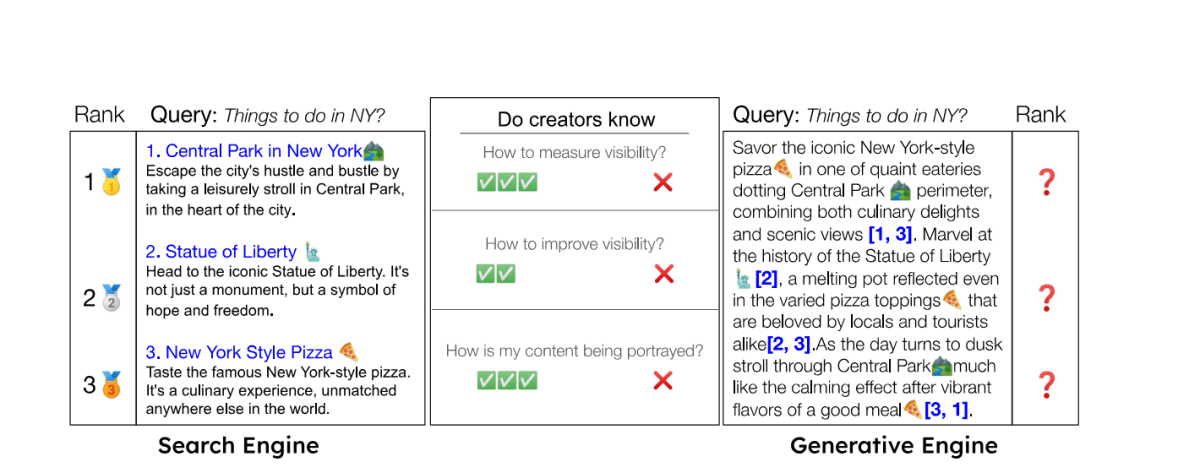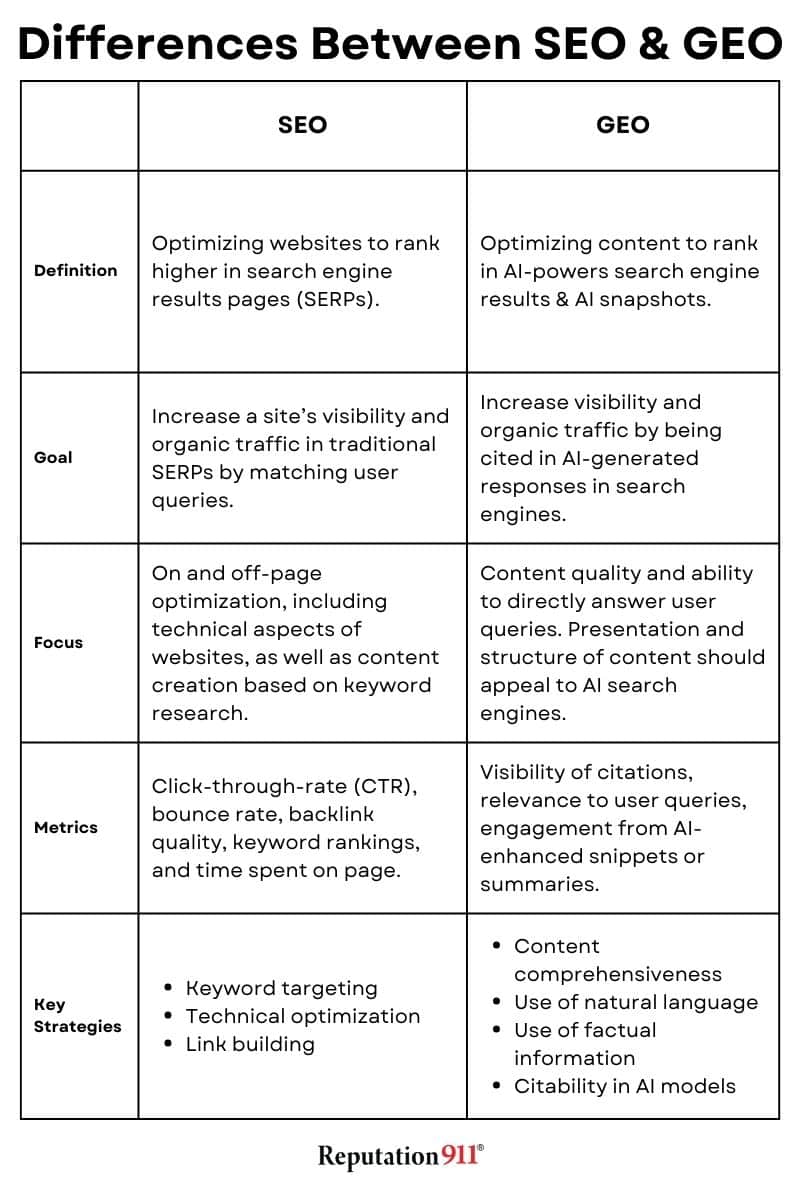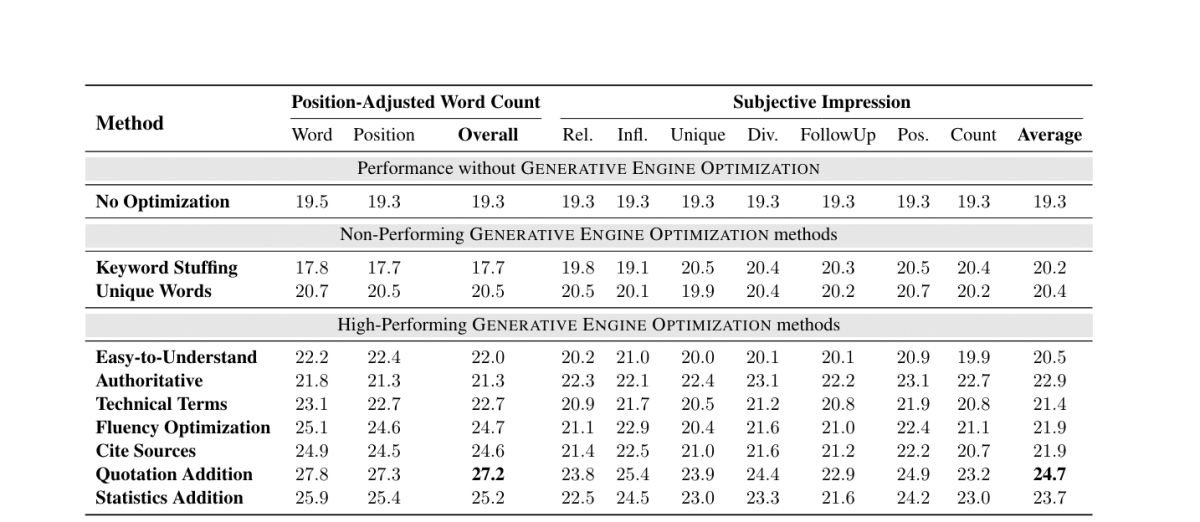SEO is a continually evolving process, and content creators have to adjust their strategies all the time. Recently with AI, search engines are making a major shift from traditional SEO to GEO. But what exactly does this mean for your content marketing strategy? Today, we’ll teach you everything you need to know about Generative Engine Optimization (GEO).
Definition of GEO (Generative Engine Optimization)
Generative Engine Optimization (GEO/Generative SEO) is about optimizing content to rank in search engines that use generative AI.
Recently, traditional search engines like Google have incorporated AI technology to improve search results for users. Instead of seeing a list of links, users see a snapshot at the top of the page addressing their search query. You can read more about this in our blog about the Google Search Generative Experience.

With the release of this technology, writers have to adjust their strategies to appear within that snapshot. From there, the concept of Generative Engine Optimization (GEO) emerges as the new strategy to do just that. We now have to create content that ranks in AI-powered search, not just in a traditional search engine results page.
Is GEO Replacing SEO?
GEO builds on top of search engine optimization (SEO) strategies, rather than replacing them completely. You don’t have to throw away everything you know about writing for search engines. Rather, the traditional strategies must evolve in the wake of AI powered search engines.
For now, traditional searches are still here. Generative AI in search results is largely still in an “experimental” phase. However, in the future we will likely see a blend of traditional SERPs and AI search. Essentially, you will see an AI snapshot followed by the typical list of links you see now.
Plus, this research paper about GEO acknowledges that content doesn’t need to change entirely. The paper outlines some methods for generative AI search engine optimization (which we’ll get to later). It has this to say:
“ With the exception of methods 3, 4, and 5, the remaining methods do not necessitate the addition of new content to the website. Instead, these methods primarily focus on enhancing the presentation of the existing content in a way that increases its persuasiveness or makes it more appealing to the generative engine.”
If you have been doing SEO the right way, by making high-quality content, you don’t have to stress about this change.
Search engines also rely on existing content to feed their new generative models. Current SEO helps these AI crawlers read and understand your text. So, SEO and GEO both need to work together.
Related: Learn how to optimize for Google Perspectives.
Differences Between Traditional SEO and GEO
Even though GEO builds on traditional SEO, there are some key differences.
Traditional SEO focuses on on-page optimization to improve rankings on traditional SERPs that show a list of links. It does this by:
- prioritizing content creation based on keyword research to match user queries
- targeting specific keyword densities, building backlinks, and meta information
- using analytics and tools to track backlinks, rankings, and keyword performance
- targeting technical website aspects like site speed, mobile-friendliness, and user navigation
- handling more straightforward, shorter queries by matching keywords and phrases
- measuring metrics like click-through rates, bounce rates, and time spent on the page
Ideally, the goal in SEO is to rank at the top of the first page of Google Search results. The closer your website is to the top, the more visibility and clicks you get.
Generative Engine Optimization (GEO) focuses on answering user queries in AI-driven search engines. It does this by:
- focusing on quality, relevance, and ability to directly answer user queries
- using natural language and context to respond to queries, rather than relying on specific keyword usage
- creating comprehensive, engaging content for machine learning algorithms that predict user intent
- prioritizing factual information and including statistics and citations from credible sources
- organizing content in a clear way so that it has a logical, more conversational flow
- including diverse perspectives, counter arguments, historical context, etc for a full picture look at the topic
- using multiple forms of media, such as text, video, infographics, etc to enhance user experience
- offering a wider range of information to handle complex, hyper specific user queries
- using metrics that assess citation visibility and the context of responses
The goal of GEO would be to optimize your content enough so that the AI-generated snapshot cites your website. This would significantly improve your site’s organic traffic, as the snapshot appears at the top of the SERP.

4 Strategies To Implement Generative Engine Optimization (GEO)
The research paper we mentioned earlier outlines new strategies to optimize your content for AI-generated search. They measured the performance of different methods against text with no optimization at all.
Certain methods yielded better results than others. With that being said, let’s get into how to implement these strategies:
Add quotes, statistics, and citations to your content
If you do nothing else, at least do this. The study found the Cite Sources, Quotation Addition, and Statistics Addition strategies to be the most effective. They increased visibility of sites on generative engines by 30-40% compared to other strategies. So, you may not need to change your text all that much to see significant GEO results.
Use these tips:
- Thoughtfully choose quotes and statistics that add value to your content. Make sure they come from reputable organizations to add credibility.
- Provide context for quotes and statistics by discussing their relevancy. They should flow naturally within the text.
- Prevent the spread of disinformation by verifying the authenticity of quotes and accuracy of statistics. Update statistics when new information comes out.
- Link directly to sources where possible.
- Highlight key information visually by using bold font, block quotes, or infographics.
Be a persuasive expert on the subject
In GEO, you want your website to be a go-to source of information. To do this, write in a persuasive way and make authoritative claims. Use these tips:
- Offer detailed information and insights that people can’t find anywhere else.
- Use active voice rather than passive voice to support the strength of your statements.
- Partner with experts in your field to enhance your arguments.
- Use technical terms, as this helps target your niche audience. But, make sure to clearly explain them to keep your content accessible to a broad audience.
- Regularly update your content with the latest research, trends, and developments.
- Use relevant case studies or real-life examples that illustrate your points.
- Offer your audience educational content that positions you as an expert.
In general, you should follow Google’s E-E-A-T guidelines. This stands for Experience, Expertise, Authoritativeness, and Trustworthiness. For SEO, this is nothing new. But, it will become even more important with GEO as search engines implement AI search.
Include relevant keywords, but avoid keyword stuffing
In GEO, there may be less of an emphasis on specific target keywords and more emphasis on context. In the future, you won’t need to focus so much on providing an exact match for search queries. Rather, your content should be comprehensive.
This means that LSI (latent semantic indexing) keywords will likely become more important as search engines integrate AI.
Latent Semantic Indexing is a method of information retrieval in natural language processing. It identifies the relationship between words to understand the meaning of a text. These semantic keywords relate to the target keyword, and help search engines understand what your content is about.
For example, if your main keyword is “digital marketing”, semantic keywords include:
- online advertising
- content strategy
- social media engagement
- PPC advertising
- brand awareness
In the future, longer, more comprehensive blogs may become the norm to comprehensively cover a topic. For now, ensure your keywords fit naturally within the text, and don’t over-do them. Offer value by using LSI keywords in your text.
Write easy-to-understand content
Fluency optimization is another important aspect of GEO. Search queries will become more conversational with AI SEO in the future, and your content should match this. Use these tips:
- Write in natural language, as if you are talking to someone. Text should have good fluency and be free from grammatical errors.
- Use the BLUF (bottom line up front) method in writing by answering questions directly, and then elaborate as needed. This helps AI models easily summarize your text.
- Ensure readers can understand your content easily. Break down complex topics to make your text accessible.
- Offer summaries for complex information so your content is quotable.
Conclusion: Stay informed about evolving GEO techniques
Generative Engine Optimization (GEO) is an incredibly new concept. Using these tips can help you optimize your content for AI-powered search. But, these technologies evolve rapidly, so it’s important to stay informed and adapt your strategies as needed.
Writing content that ranks in search engines is a major part of SEO reputation management. SEO and GEO techniques are complicated, especially for beginners.
When you need the experts, come to Reputation911 for both personal and business reputation management services. Contact us for a free consultation today.




